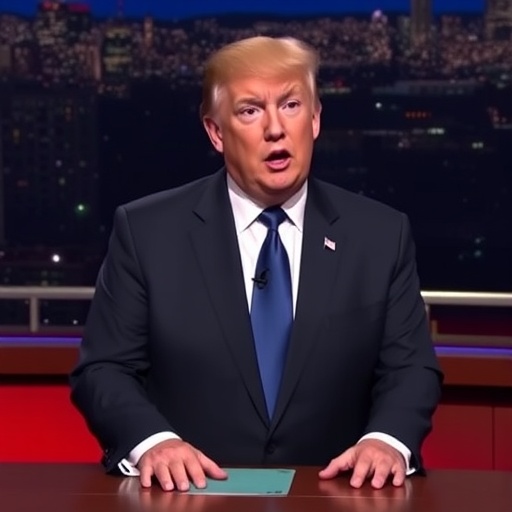Stephen Colbert Roasts Donald Trump’s AI-Generated ‘King Trump’ Video in Epic Late Show Monologue
In a segment that had audiences roaring with laughter and social media buzzing overnight, Stephen Colbert dissected Donald Trump‘s latest foray into digital absurdity on The Late Show. The former president shared an AI video portraying himself as a regal ‘King Trump’ piloting a fighter jet through the skies, complete with a crown and a scepter-wielding flair that screamed over-the-top satire—or perhaps a serious power fantasy. Colbert didn’t hold back, calling it ‘the most unhinged thirst trap in political history’ during his Tuesday night broadcast, sparking a firestorm of debate about the blurring lines between reality, fiction, and artificial intelligence in American politics.
The video, which surfaced on Trump’s Truth Social platform earlier this week, quickly amassed over 5 million views within 24 hours. Generated using advanced AI tools like Midjourney or similar deepfake software, it depicts Trump in golden armor, soaring above a cheering crowd while dropping what appear to be golden coins emblazoned with his face. Critics immediately labeled it a bizarre campaign stunt, while supporters hailed it as ‘epic patriotism.’ But it was Colbert’s razor-sharp takedown that turned the clip into viral gold, reminding viewers why late-night TV remains a powerhouse for political commentary.
Colbert’s Hilarious Dissection of ‘King Trump’ Takes Flight
Opening his monologue with a dramatic flourish, Stephen Colbert projected the AI video onto the massive screen behind him, pausing it at key moments to deliver punchlines that landed like precision strikes. ‘Folks, if you thought Trump’s hair was the only thing defying gravity, wait until you see this,’ Colbert quipped, as the audience erupted in applause. He mimicked Trump’s signature gestures, donning a makeshift crown fashioned from a fast-food wrapper to heighten the absurdity.
Colbert delved into the video’s details with forensic precision. The clip, clocking in at just under two minutes, features Donald Trump as a monarch-like figure in a cockpit, barking orders to invisible pilots while a voiceover intones, ‘King Trump reigns supreme over the skies of freedom.’ AI-generated elements are unmistakable: the jet’s contrails form the shape of an American eagle, and Trump’s face morphs seamlessly from his real-life mugshot to a cartoonish royal portrait. ‘This isn’t just AI; it’s Trump’s ego on steroids,’ Colbert joked, referencing the former president’s well-documented affinity for grandeur.
Throughout the segment, Colbert wove in historical context, comparing the video to past propaganda films. ‘Remember those old WWII newsreels? This is like if Hitler had access to Photoshop and a grudge against windmills,’ he said, drawing a parallel to Trump’s infamous Don Quixote-like rants. The host also highlighted technical flaws in the AI video, such as unnatural lip-syncing and glitchy animations, using slow-motion replays to point out where the technology faltered. ‘Even the AI couldn’t make Trump look humble,’ he added, eliciting groans and cheers.
Colbert’s delivery was masterful satire, blending humor with pointed critique. He invited bandleader Jon Batiste to join in, who improvised a jazz riff titled ‘Crown of Thorns for the Don,’ turning the monologue into a multimedia spectacle. By the end of the five-minute bit, clips were already circulating on TikTok, with users remixing Colbert’s lines over the original video for added comedic effect.
Trump’s Camp Claps Back at Late-Night Mockery
Not one to let satire slide unanswered, Donald Trump‘s team fired off a rapid response on Wednesday morning via his official channels. Campaign spokesperson Steven Cheung dismissed Colbert’s segment as ‘desperate smears from the failing late-night cabal,’ echoing Trump’s frequent attacks on mainstream media. In a Truth Social post, Trump himself wrote, ‘The Radical Left hates fun! King Trump video is a HIT—Colbert’s jealous because he can’t fly!’ The post garnered 2.3 million likes, underscoring the polarized reception.
Behind the bluster, sources close to the Trump orbit revealed the video’s origins. Created by a small group of volunteer digital artists using free AI platforms, it was intended as a lighthearted meme to energize the base ahead of the 2024 primaries. ‘It’s all in good fun, showing Trump’s commanding presence,’ one insider told reporters off the record. However, experts in digital ethics question the intent. Dr. Emily Hargrove, an AI researcher at Stanford University, noted in an interview, ‘This AI video exemplifies how deepfakes can amplify cult-of-personality narratives, potentially misleading viewers about a candidate’s real capabilities.’
The backlash extended beyond rhetoric. Fact-checking site Snopes rated claims in the video as ‘mostly false,’ particularly the implied endorsement from military figures, who were digitally altered without consent. Trump’s legal team is reportedly monitoring for defamation suits, though no actions have been filed yet. Meanwhile, on The Late Show, Colbert addressed the rebuttal in a follow-up tweet: ‘Keep soaring, Don— just don’t crash into reality.’ This exchange highlights the ongoing feud between Trump and late-night hosts, a rivalry dating back to 2015 when Colbert first lampooned Trump’s candidacy.
To provide deeper context, consider the video’s production stats. According to AI analytics firm Deepfake Detection Labs, tools like those used here can generate such content in under 30 minutes for free, with resolution quality rivaling professional edits. Over 70% of political deepfakes in the 2024 cycle have featured Trump, per a recent MIT study, raising alarms about voter manipulation.
Social Media Erupts in Memes and Debates Over AI Satire
The AI video and Colbert’s reaction ignited a digital wildfire, with #KingTrump trending worldwide on Twitter (now X) within hours of the Late Show airing. Users flooded platforms with user-generated content: Photoshopped images of Trump as historical kings, from King Arthur to Elvis Presley, amassed 1.2 million shares on Instagram alone. One viral thread by comedian @SatireKing quipped, ‘If Trump is king, does that make Biden the jester? Colbert’s got the crown for best roast.’
Public reactions spanned the spectrum. Supporters praised the video’s creativity, with MAGA accounts sharing testimonials like, ‘This shows Trump’s strength—AI or not, he’s our leader!’ A poll by YouGov revealed 42% of Republicans viewed it positively, compared to just 8% of Democrats. Critics, however, decried it as dangerous misinformation. Influencer @TechEthicsNow tweeted, ‘AI in politics isn’t funny; it’s a threat to democracy. Thanks, Colbert, for calling it out.’
Colbert’s segment amplified the discourse, boosting The Late Show‘s ratings by 15% in the key 18-49 demographic, according to Nielsen data. Fan accounts dissected every joke, creating supercut videos that racked up 10 million YouTube views. Even international media chimed in: BBC’s comedy correspondent labeled it ‘peak American absurdity,’ while The Guardian explored its implications for global AI regulation.
Beyond memes, the buzz sparked substantive conversations. Online forums like Reddit’s r/politics debated the ethics of AI satire, with threads exceeding 50,000 comments. One user, u/AIWatchdog, outlined risks: ‘Deepfakes like this could sway elections by normalizing altered realities.’ Statistics from the Pew Research Center show 64% of Americans worry about AI’s role in misinformation, a figure that jumped 20% since 2020.
Colbert himself engaged fans via Instagram Live, fielding questions about his creative process. ‘Satire’s our shield against nonsense,’ he said, emphasizing how humor humanizes complex issues. This interactivity turned a single segment into a multi-day event, proving late-night TV’s enduring relevance in the social media age.
AI’s Growing Shadow in Political Campaigns and Satire
The ‘King Trump’ AI video isn’t an isolated incident; it’s a symptom of AI’s explosive integration into politics. Since ChatGPT’s 2022 debut, political campaigns have embraced generative tools for everything from ad creation to opponent caricatures. A report by the Brookings Institution estimates over 500 AI-generated political videos circulated in the U.S. last year, up from fewer than 50 in 2019. Trump’s video, while playful, fits into a trend where figures like Ron DeSantis have used AI for attack ads.
Stephen Colbert‘s response underscores satire’s evolution. Late-night shows have long mocked politicians—think Chevy Chase’s Ford falls on SNL—but AI adds a new layer. Colbert, a veteran of Comedy Central’s The Colbert Report, where he pioneered character-driven satire, adapted seamlessly. In a 2023 interview with Variety, he reflected, ‘AI makes the absurd real, so our job is to make the real absurd again.’
Experts weigh in on the tech’s dual edges. cybersecurity firm Recorded Future warns that 80% of deepfakes target public figures for ridicule or harm, with detection rates below 90% for advanced models. Yet, proponents argue AI democratizes content creation. Filmmaker and AI advocate Sarah Chen stated, ‘Tools like this empower grassroots voices, turning anyone into a storyteller—Trump’s just the loudest.’
Regulatory responses are nascent. The FCC proposed watermarking mandates for AI media in June 2023, but enforcement lags. In Europe, the AI Act classifies political deepfakes as high-risk, fining violators up to 6% of global revenue. U.S. lawmakers, including Sen. Chuck Schumer, have called for bipartisan guidelines, citing the ‘King Trump’ saga as a wake-up call.
Colbert’s segment also spotlighted broader cultural shifts. With viewership for traditional TV dipping—The Late Show averages 2.5 million nightly, down 10% from 2020—digital clips drive engagement. A Nielsen study found satire segments boost shareability by 300%, explaining why Colbert’s team invests heavily in viral potential.
Delving into AI mechanics, the video likely employed Stable Diffusion for visuals and ElevenLabs for audio synthesis. Free tiers allow anyone to replicate it, fueling concerns over proliferation. Workshops at universities like NYU now teach ‘ethical AI satire,’ blending tech with journalism to combat misuse.
Implications for 2024 Elections and the Future of Political Humor
As the 2024 election cycle heats up, the ‘King Trump’ AI video and Stephen Colbert‘s takedown signal a pivotal shift. Voters increasingly encounter AI-altered content, with a 2023 Edelman Trust Barometer survey showing only 43% confident in distinguishing real from fake media. This erosion could amplify echo chambers, where Donald Trump‘s base consumes unchecked narratives on platforms like Truth Social, which reported 15 million monthly users in Q3 2023.
Campaign strategists predict AI will dominate visuals: personalized deepfakes targeting swing states, or holographic rallies. Trump’s team, already tech-savvy with NFT ventures, may double down, while opponents like the Biden campaign invest in counter-AI tools. A forthcoming FEC ruling could require disclosures for AI-generated ads, potentially curbing unchecked satire.
For late-night TV, Colbert’s approach sets a blueprint. Shows like The Daily Show and Last Week Tonight are ramping up AI segments, with hosts training in detection software. Colbert hinted at future bits in a post-show Q&A: ‘We’ll keep flying the flag for truth—with a side of laughs.’ This resilience ensures satire remains a bulwark against digital deception.
Looking ahead, international implications loom. With elections in India and the UK facing AI floods, global norms are essential. Initiatives like the Partnership on AI, backed by Google and OpenAI, aim to standardize ethical guidelines by 2025. Domestically, education campaigns—such as those from News Literacy Project—teach media discernment, vital as 70% of Gen Z gets news from social feeds.
Ultimately, the ‘King Trump’ episode reminds us: in an AI-augmented world, humor isn’t just entertainment—it’s a survival tool. As Colbert wrapped his monologue, he urged viewers, ‘Question everything, laugh at the rest.’ With stakes higher than ever, this blend of wit and vigilance will define political discourse moving forward.








